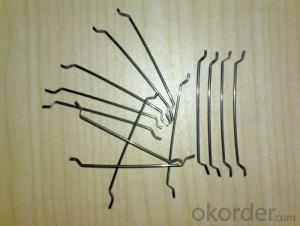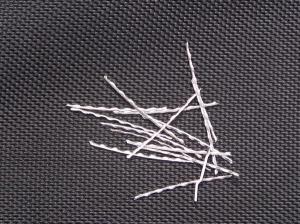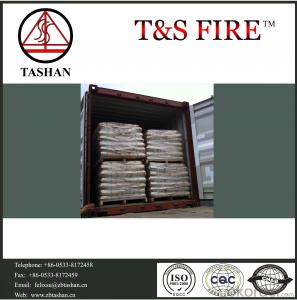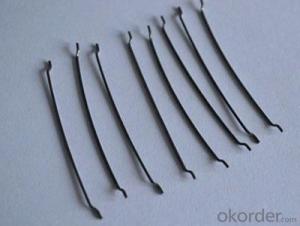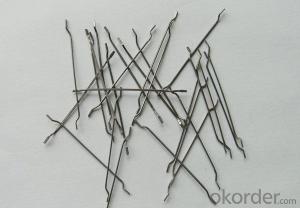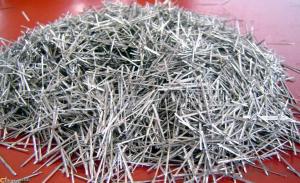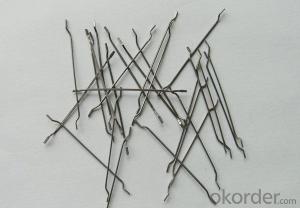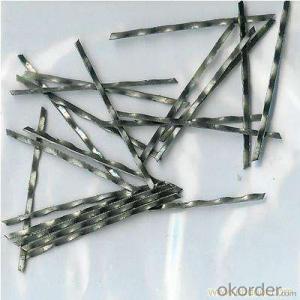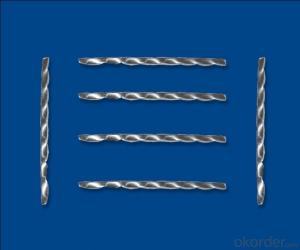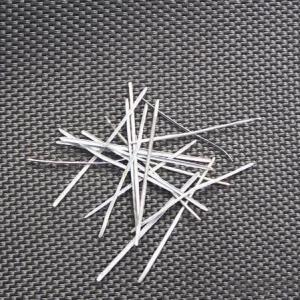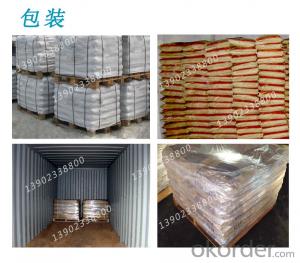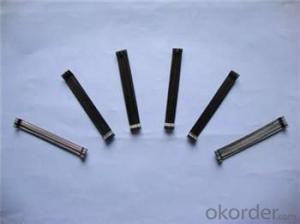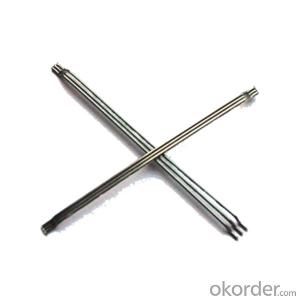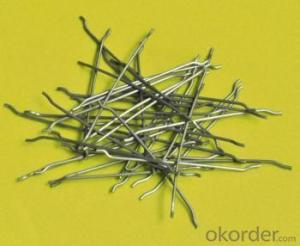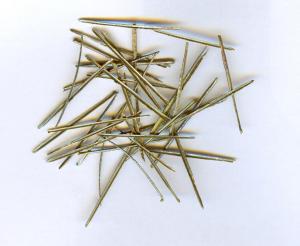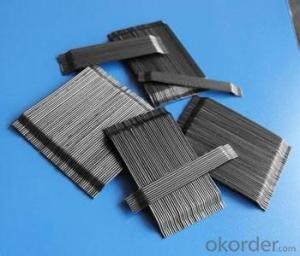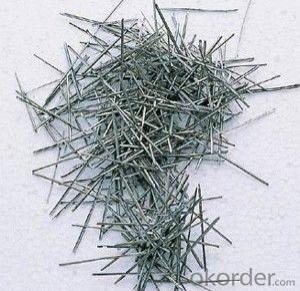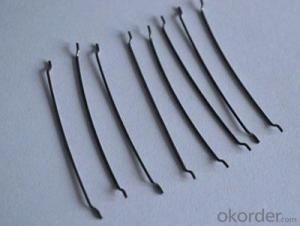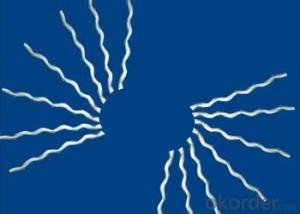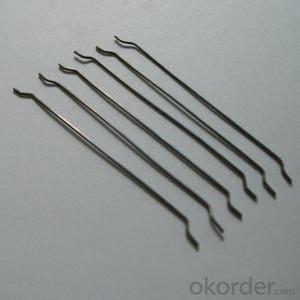Steel Fiber Loose company CNBM International China
- Loading Port:
- Tianjin
- Payment Terms:
- TT OR LC
- Min Order Qty:
- 1000 kg
- Supply Capability:
- 30000 kg/month
OKorder Service Pledge
OKorder Financial Service
You Might Also Like
Quick Details
Place of Origin: Tianjin, China (Mainland)
Brand Name: CNBM
Model Number: 0.55
Material: Steel
Production Process: Cold drawn
Fiber Lengh: 35
Type: 1
Compressive Strength: >1200MPa
Aspect ratio: 63
Standard: ASTM A820M-11
Section Shape: Circular
Application: Concrete Reinforcement
Producing Area: Tianjin
Product Application: Industrial Floor
Specifications
| Diameter | 0.55 mm (0.217 in) | ||
| Length | 35 mm (13.780 in) | ||
| Aspect Ratio | 63 | ||
| Tensile strength | 1200 MPa | ||
| Type | Cold drawn Steel Fiber | ||
| End | Hooked-end Steel Fiber | ||
| Glued/Loose | Glued Steel Fiber | ||
| Bending Angle | 45°(min.30°) | ||
| Usage & Performance | Floor:Trafficked areas and Industrial floors | ||
| Shotcrete :Slope stabilization and Final lining | |||
| Precast concrete:Pipe and Railway sleepers | |||
| Packing | Standard Export Pallet Packing | Bag Packing | 20 kg/Bag,50 bags/Pallet |
| Bulk Packing | 1,000kg/ Bulk Bag | ||
| Loading Quantity | 20’GP | 20-25 Tonne/Tonnes | |
| 40’GP | 25-27 Tonne/Tonnes | ||
| 40’HQ | 25-27 Tonne/Tonnes | ||
| MOQ | 1 kg for trial order | ||
| Supply Ability | 10,000 Tonne/Tonnes per Year | ||
| Payment Terms | T/T or L/C at sight | ||
| Delivery Time | Within 15 days after receiving deposit or original L/C at sight | ||
| Certification | ISO9001:2000, CE, | ||
Picture
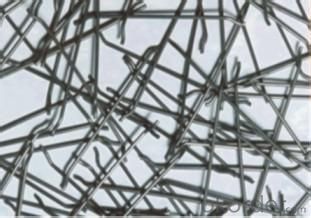
Steel fiber
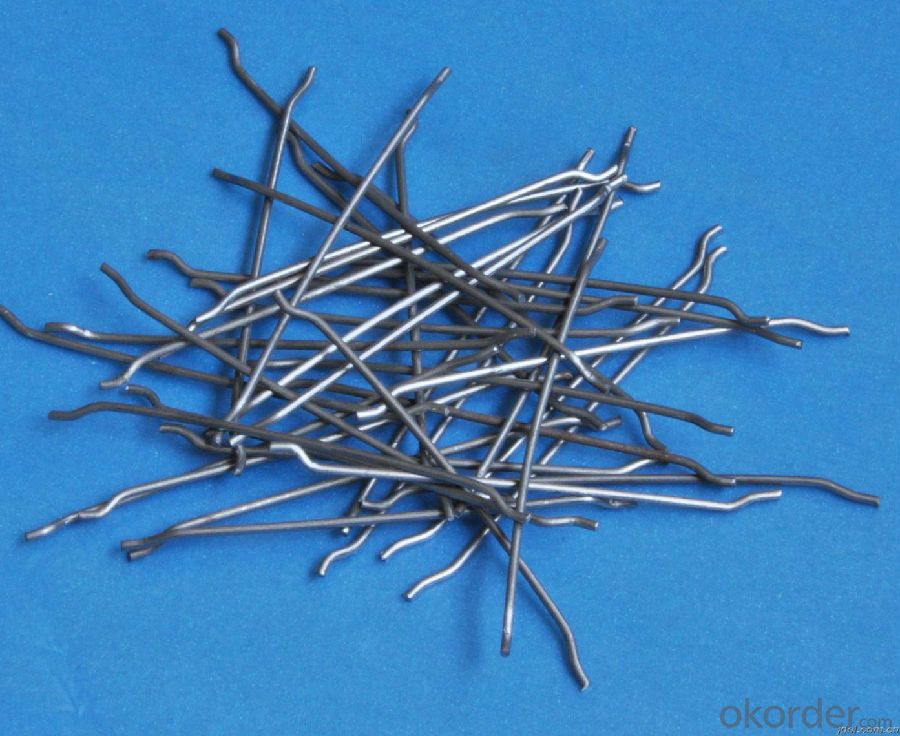
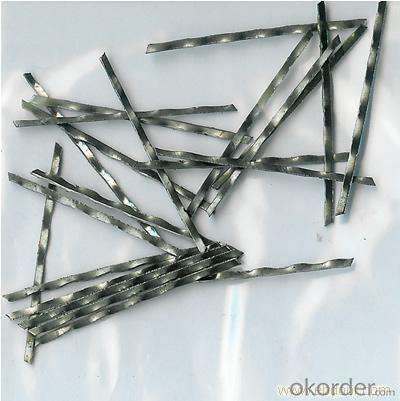
FAQ
certificated: ISO 9001
Technical advantages of Daye steel fiber:
A. Improve mechanical performance of concrete
B. Provide uniform distribution throughout concrete with excellent mixing
C. No balling or caking by adopt correct mixing method
D. Reduce concrete volume
E.Save construction time and cost
F.Reduce excavation volume
G.Available for jointless floor.
- Q:How does melt extract stainless steel fiber enhance the durability of concrete structures?
- The durability of concrete structures is greatly improved by the addition of melt extract stainless steel fiber. These fibers provide various advantages that contribute to the overall strength and longevity of the structure. To begin with, melt extract stainless steel fibers play a crucial role in enhancing the resistance to cracking in concrete. Acting as reinforcement, these fibers distribute stress and minimize the formation of shrinkage cracks. This is especially important in environments with extreme temperature variations or heavy loads, as it prevents the development of cracks that could compromise the structure's integrity. Furthermore, stainless steel fibers enhance the toughness and impact resistance of concrete. By dispersing throughout the concrete matrix, they create a three-dimensional network of reinforcement that improves the material's ability to absorb and distribute energy upon impact. This increased toughness prevents cracks from spreading, making the structure more durable and resistant to damage from external forces. Another significant advantage of melt extract stainless steel fibers is their ability to enhance the resistance to corrosion in concrete structures. Stainless steel is naturally resistant to rust and oxidation, even in harsh environments. By incorporating these fibers into the concrete mix, an additional layer of protection against corrosion is provided, thereby increasing the lifespan of the structure and reducing the need for maintenance and repair. Additionally, the use of melt extract stainless steel fibers can improve the fire resistance of concrete structures. Due to its high melting point, stainless steel helps delay structural failure under high temperatures when added to concrete. This is particularly important in buildings and structures where fire safety is a critical concern. In conclusion, the incorporation of melt extract stainless steel fibers significantly enhances the durability of concrete structures. By improving resistance to cracking, increasing toughness and impact resistance, enhancing corrosion resistance, and improving fire resistance, these fibers ensure that the concrete structure remains strong and intact for a longer period, reducing the need for repairs and replacements and ultimately saving costs.
- Q:Is melt extract stainless steel fiber compatible with different types of shotcrete accelerators?
- Different types of shotcrete accelerators can be used with melt extract stainless steel fiber, as they are compatible. Shotcrete accelerators are employed to quicken the setting and hardening processes of shotcrete or concrete. To enhance the mechanical properties and durability of the final product, melt extract stainless steel fibers are frequently incorporated into shotcrete mixes. These fibers, made from stainless steel, possess exceptional corrosion resistance, allowing them to be compatible with various shotcrete accelerators. The inclusion of melt extract stainless steel fibers can bolster the bond strength, crack resistance, and impact resistance of shotcrete, regardless of the accelerator type. Thus, it is safe to assert that melt extract stainless steel fiber is compatible with different types of shotcrete accelerators.
- Q:What is the effect of melt extract stainless steel fiber on the workability of shotcrete?
- The workability of shotcrete can be significantly impacted by the utilization of melt extract stainless steel fiber. Melt extract stainless steel fibers are commonly incorporated into shotcrete mixes to enhance its mechanical properties, including tensile strength, toughness, and durability. One of the primary impacts of melt extract stainless steel fiber on shotcrete workability is the enhancement of cohesion and resistance to segregation. By acting as a reinforcement within the shotcrete matrix, the fibers effectively increase its viscosity and prevent the settling of aggregate particles. As a result, a more uniform mixture is achieved, which is easier to handle and apply. Furthermore, the addition of melt extract stainless steel fibers can improve the overall consistency and pumpability of shotcrete. The fibers serve as a lubricant, reducing friction between particles and facilitating smoother pumping and spraying. Consequently, the workability is improved, as the shotcrete can be maneuvered more easily into intricate shapes and confined spaces. Moreover, melt extract stainless steel fibers have the ability to enhance the bond strength between shotcrete and the substrate. Through the creation of a mechanical interlock with the substrate, the fibers increase adhesion and prevent delamination. This not only improves workability during application but also enhances the long-term durability and performance of the shotcrete. It is worth noting that the impact of melt extract stainless steel fiber on shotcrete workability may vary depending on factors such as fiber dosage, length, aspect ratio, and mix design. Thus, it is essential to carefully consider the specific requirements of the project and seek guidance from experienced professionals to determine the optimal fiber dosage and mix proportions for achieving the desired workability and performance.
- Q:Can melt extract stainless steel fiber be used in decorative precast concrete applications?
- Yes, melt extract stainless steel fiber can be used in decorative precast concrete applications.
- Q:Can melt extract stainless steel fiber be used in residential driveway pavements?
- Residential driveway pavements can benefit from the use of melt extract stainless steel fiber. It is common to incorporate stainless steel fibers into concrete applications to enhance strength, durability, and resistance to cracking. Adding these fibers to the concrete mix improves performance and longevity. Melt extract stainless steel fiber offers numerous advantages for residential driveway pavements. Firstly, it helps minimize cracks and surface defects caused by heavy vehicle traffic or changes in weather conditions. By reinforcing the concrete, the fibers make it more resistant to shrinkage, expansion, and cracking. Furthermore, stainless steel fibers enhance the overall strength of the concrete, increasing its load-bearing capacity. This is especially crucial for driveways that need to withstand the weight of vehicles and regular usage. The fibers ensure that loads are distributed evenly across the pavement surface, reducing the risk of structural damage. In addition, stainless steel fibers are corrosion-resistant, guaranteeing the driveway's longevity. They remain unaffected by moisture, chemicals, or other environmental factors that can lead to deterioration. This makes them an ideal choice for residential driveways, which are exposed to various conditions. In conclusion, melt extract stainless steel fiber is a valuable addition to residential driveway pavements. It enhances the strength and durability of the concrete, reduces cracking, and extends the lifespan of the driveway. Homeowners can rely on stainless steel fibers to keep their driveways in excellent condition for years to come.
- Q:How does melt extract stainless steel fiber improve the resistance to chemical attack in concrete?
- The unique properties and characteristics of melt extract stainless steel fiber are well-known for their ability to enhance the resistance of concrete to chemical attack. When added to concrete mixtures, these stainless steel fibers act as reinforcement, improving the longevity and durability of the concrete structure. One way in which melt extract stainless steel fiber enhances resistance to chemical attack is by creating a physical barrier against corrosive substances. Concrete is susceptible to deterioration over time due to the penetration of acids, alkalis, and chlorides. However, the addition of stainless steel fibers creates a network of reinforcement within the concrete, acting as a protective barrier against chemical intrusion. This reduces concrete permeability and prevents corrosive substances from damaging the underlying steel reinforcement. Additionally, melt extract stainless steel fiber improves resistance to chemical attack by enhancing the mechanical properties of the concrete. The inclusion of stainless steel fibers increases flexural strength, tensile strength, and impact resistance, making the concrete more resistant to cracking and spalling caused by chemical exposure. This improved mechanical performance helps maintain the integrity of the concrete structure and prevents corrosive substances from infiltrating through cracks and fissures. Moreover, stainless steel fibers also play a crucial role in minimizing the effects of chemical attack by reducing the formation of microcracks in the concrete. Chemical attack can lead to the formation of cracks and fractures, accelerating the deterioration process. However, the presence of stainless steel fibers helps distribute stress and load more evenly, preventing the concentration of forces that cause crack formation. By minimizing the formation of microcracks, stainless steel fibers effectively reduce the vulnerability of the concrete to chemical attack, enhancing its overall durability. In conclusion, melt extract stainless steel fiber enhances the resistance of concrete to chemical attack by forming a physical barrier, improving mechanical properties, and minimizing microcrack formation. These combined effects result in a more durable and long-lasting concrete structure that can better withstand the detrimental effects of chemical exposure.
- Q:Can melt extract stainless steel fiber be used in self-compacting concrete (SCC)?
- Indeed, melt extract stainless steel fibers are capable of being utilized in self-compacting concrete (SCC). SCC, a type of concrete that possesses high fluidity and is able to occupy and flow into even the most densely packed reinforcement areas without the need for vibration, often incorporates stainless steel fibers to augment its mechanical characteristics, including flexural strength, impact resistance, and toughness. The production of melt extract stainless steel fibers involves a melt extraction process, which guarantees consistent quality and uniform dispersion of fibers within the concrete matrix. These fibers exhibit exceptional resistance to corrosion and possess outstanding durability, rendering them suitable for employment in SCC, which is frequently employed in the construction of high-performance and long-lasting concrete structures. The inclusion of melt extract stainless steel fibers in SCC yields improvements in its ductility, crack resistance, and overall performance. These fibers function as reinforcement, supplying supplementary tensile strength to the concrete and diminishing the likelihood of cracking. Additionally, they aid in the control of shrinkage and the prevention of plastic shrinkage cracks. Moreover, melt extract stainless steel fibers contribute to the post-cracking behavior of SCC by heightening its resistance to cracking and ensuring the integrity of the concrete even subsequent to cracking. This is especially advantageous in scenarios where the control of cracks and the preservation of structural integrity are of utmost importance, such as in industrial flooring, tunnel linings, and precast elements. To summarize, melt extract stainless steel fibers can be effectively employed in self-compacting concrete (SCC) to enhance its mechanical properties, enhance crack resistance, and ensure long-term durability. The inclusion of these fibers in SCC can result in the creation of sturdier and more enduring concrete structures, rendering them a fitting choice for a variety of construction applications.
- Q:Is melt extract stainless steel fiber resistant to corrosion?
- Yes, melt extract stainless steel fiber is highly resistant to corrosion. Stainless steel fibers are made from a high-grade alloy of steel that contains chromium, which forms a protective layer on the surface of the fiber. This layer, known as a passive layer, prevents the steel from coming into direct contact with corrosive elements in the environment, such as moisture, oxygen, and chlorides. As a result, the fiber remains resistant to rust and corrosion even in harsh conditions, including high temperatures, acidic or alkaline environments, and exposure to chemicals. Therefore, melt extract stainless steel fiber is an excellent choice for applications where corrosion resistance is required, such as in concrete reinforcement, refractory materials, and composite materials.
- Q:How is melt extract stainless steel fiber produced?
- Melt extract stainless steel fiber is produced through a specialized manufacturing process. The first step involves melting high-quality stainless steel alloy in a furnace at extremely high temperatures. The molten steel is then forced through a spinneret, which is a fine nozzle with multiple small holes. As the molten steel is extruded through these holes, it solidifies and forms thin fibers. Once the fibers are formed, they are rapidly cooled and solidified by passing them through a cooling chamber or a quench bath. This process ensures that the fibers maintain their desired shape and strength. After cooling, the fibers are collected and further processed to remove any impurities or contaminants. The collected stainless steel fibers are typically cut into shorter lengths to enhance their usability in various applications. They can be further processed to modify their surface properties, such as by coating them with a protective layer or applying different surface treatments. The melt extract process allows for the production of stainless steel fibers with consistent dimensions and properties. These fibers possess excellent tensile strength, corrosion resistance, and high thermal conductivity, making them suitable for a wide range of applications. They are commonly used in concrete reinforcement, refractories, filtration systems, and as conductive additives in various industries.
- Q:How does melt extract stainless steel fiber affect the cracking behavior of concrete?
- The cracking behavior of concrete is significantly impacted by melt extract stainless steel fiber. These fibers, produced by melting stainless steel and extracting it into varying lengths of fibers, are commonly used to reinforce concrete structures. Using melt extract stainless steel fiber has several benefits in enhancing the crack resistance of concrete. When added to the concrete mix, these fibers act as reinforcement, providing extra strength and preventing crack propagation. This is especially important for concrete structures that experience heavy loads or dynamic forces, as they are more prone to cracking. The presence of stainless steel fibers in concrete improves its tensile strength, which is usually lower than its compressive strength. Consequently, the concrete becomes more resistant to cracking as the fibers help distribute stress and prevent crack formation and propagation. This improved crack resistance is particularly advantageous in applications where concrete undergoes shrinkage, thermal expansion, or external loading, as it helps maintain the structure's integrity and durability. Furthermore, melt extract stainless steel fibers also improve the behavior of concrete after cracking. In conventional concrete, once a crack forms, it tends to spread rapidly, compromising structural integrity and reducing load-bearing capacity. However, with the addition of stainless steel fibers, these cracks are effectively bridged and restrained, reducing their width and preventing further propagation. This post-cracking behavior is crucial in maintaining the concrete's structural performance and serviceability under different loading conditions. In summary, melt extract stainless steel fiber has a significant impact on the cracking behavior of concrete by enhancing its crack resistance, tensile strength, and post-cracking behavior. By reinforcing the concrete matrix, these fibers prevent crack formation and propagation, improving the durability and structural integrity of concrete structures.
1. Manufacturer Overview |
|
|---|---|
| Location | |
| Year Established | |
| Annual Output Value | |
| Main Markets | |
| Company Certifications | |
2. Manufacturer Certificates |
|
|---|---|
| a) Certification Name | |
| Range | |
| Reference | |
| Validity Period | |
3. Manufacturer Capability |
|
|---|---|
| a)Trade Capacity | |
| Nearest Port | |
| Export Percentage | |
| No.of Employees in Trade Department | |
| Language Spoken: | |
| b)Factory Information | |
| Factory Size: | |
| No. of Production Lines | |
| Contract Manufacturing | |
| Product Price Range | |
Send your message to us
Steel Fiber Loose company CNBM International China
- Loading Port:
- Tianjin
- Payment Terms:
- TT OR LC
- Min Order Qty:
- 1000 kg
- Supply Capability:
- 30000 kg/month
OKorder Service Pledge
OKorder Financial Service
Similar products
New products
Hot products
Hot Searches
Related keywords
